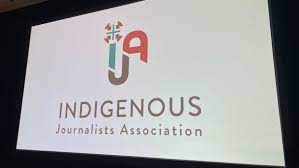News Based on facts, either observed and verified directly by the reporter, or reported and verified from knowledgeable sources.
Out with the old, in with the new
 The Native American Journalists Association has a new name and logo: the Indigenous Journalists Association. The membership voted to rename the organization at the organization's annual conference in Winnipeg, Manitoba, Canada, officials announced at a membership luncheon on Friday, Aug. 11, 2023. (Photo by Jourdan Bennett-Begaye, ICT)
The Native American Journalists Association has a new name and logo: the Indigenous Journalists Association. The membership voted to rename the organization at the organization's annual conference in Winnipeg, Manitoba, Canada, officials announced at a membership luncheon on Friday, Aug. 11, 2023. (Photo by Jourdan Bennett-Begaye, ICT)
Members of the Native American Journalists Association vote to change the name of the organization
The Native American Journalists Association’s name is no more after members voted to change the name at the organization’s annual conference in Winnipeg, Manitoba, Canada.
By a membership vote of 89-55, the organization is now the Indigenous Journalists Association.
The new name and logo were announced Friday, Aug. 11, during a membership luncheon.
President Graham Lee Brewer, Cherokee, said in a press release that Indigenous journalists have been inserting themselves into newsrooms across the world “as the rightful storytellers of their own narratives.”
“It’s long overdue, and we’re so proud and excited to be a part of that movement,” Brewer said. “Connecting with our brothers and sisters across the globe, from Canada to New Zealand, has made it clear that as Indigenous peoples the struggles we face in this industry are universal.”
It’s the second name change since the organization’s founding in 1983. Originally called the Native American Press Association, the group changed its name in 1990 to the Native American Journalists Association to encapsulate and support Native voices across all media platforms.
Executive Director Rebecca Landsberry-Baker, Muscogee (Creek), said preparation for the name change has been underway for the last year, including a new website, indigenousjournalists.org.
“Once again, our members have thoughtfully considered a name change to be more inclusive of Indigenous journalists globally,” Landsberry-Baker said in a statement. “I’m looking forward to expanding support for our members and the communities we serve over IJA’s next 40 years.”
Along with supporting Indigenous journalists, the organization is committed to increasing Indigenous representation in the mainstream media.
“We live in a time when it is possible to connect and create deep, meaningful relationships with Indigenous journalists no matter where they are, and we look forward to helping them find each other to share their knowledge and support,” Brewer said.
The Indigenous Journalists Association has more than 850 members who work across media platforms.
Newly elected members of the board of directors were also announced Friday. Sunnie Clahchischiligi, Diné, and Joseph Lee, Wampanoag Tribe of Gay Head, are the latest members elected to serve, and Jourdan Bennett-Begaye, Diné, who is editor of ICT, was returned to the board.
Other board members who will serve out the remainder of their terms are Savannah Maher, Mashpee Wampanoag; Jodi Rave Spotted Bear, Mandan, Hidatsa and Arikara Nation and Lakota; Christine Trudeau, Prairie Band Potawatomi Nation; Angel Ellis, Muscogee (Creek) Nation; Angel Moore, Peguis First Nation; and Shondiin Silversmith, Diné.
More information on the organization and the name change can be found at naja.com or indigenousjournalists.org.
